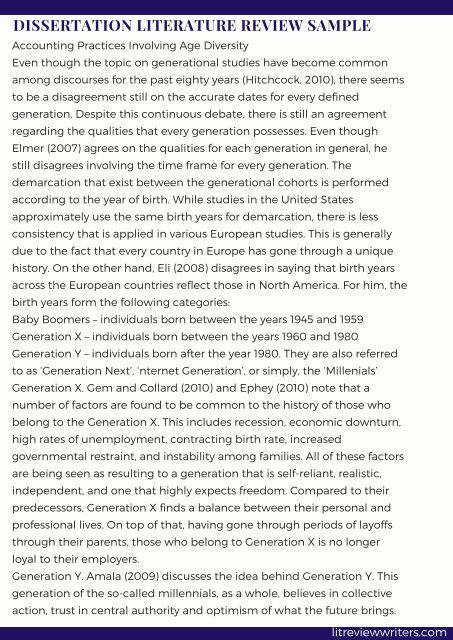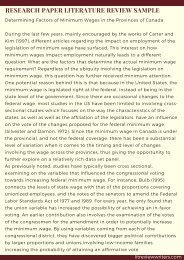Dissertation Literature Review Sample
Howdy! Take a look at this article with a dissertation literature review sample and discover how to write it. For more click this link http://www.litreviewwriters.com/dissertation-review-help/
Howdy! Take a look at this article with a dissertation literature review sample and discover how to write it. For more click this link http://www.litreviewwriters.com/dissertation-review-help/
You also want an ePaper? Increase the reach of your titles
YUMPU automatically turns print PDFs into web optimized ePapers that Google loves.
DISSERTATION LITERATURE REVIEW SAMPLE<br />
Accounting Practices Involving Age Diversity<br />
Even though the topic on generational studies have become common<br />
among discourses for the past eighty years (Hitchcock, 2010), there seems<br />
to be a disagreement still on the accurate dates for every defined<br />
generation. Despite this continuous debate, there is still an agreement<br />
regarding the qualities that every generation possesses. Even though<br />
Elmer (2007) agrees on the qualities for each generation in general, he<br />
still disagrees involving the time frame for every generation. The<br />
demarcation that exist between the generational cohorts is performed<br />
according to the year of birth. While studies in the United States<br />
approximately use the same birth years for demarcation, there is less<br />
consistency that is applied in various European studies. This is generally<br />
due to the fact that every country in Europe has gone through a unique<br />
history. On the other hand, Eli (2008) disagrees in saying that birth years<br />
across the European countries reflect those in North America. For him, the<br />
birth years form the following categories:<br />
Baby Boomers – individuals born between the years 1945 and 1959<br />
Generation X – individuals born between the years 1960 and 1980<br />
Generation Y – individuals born after the year 1980. They are also referred<br />
to as ‘Generation Next’, ‘nternet Generation’, or simply, the ‘Millenials’<br />
Generation X. Gem and Collard (2010) and Ephey (2010) note that a<br />
number of factors are found to be common to the history of those who<br />
belong to the Generation X. This includes recession, economic downturn,<br />
high rates of unemployment, contracting birth rate, increased<br />
governmental restraint, and instability among families. All of these factors<br />
are being seen as resulting to a generation that is self-reliant, realistic,<br />
independent, and one that highly expects freedom. Compared to their<br />
predecessors, Generation X finds a balance between their personal and<br />
professional lives. On top of that, having gone through periods of layoffs<br />
through their parents, those who belong to Generation X is no longer<br />
loyal to their employers.<br />
Generation Y. Amala (2009) discusses the idea behind Generation Y. This<br />
generation of the so-called millennials, as a whole, believes in collective<br />
action, trust in central authority and optimism of what the future brings.<br />
litreviewwriters.com
DISSERTATION LITERATURE REVIEW SAMPLE<br />
They like being members of a team, working together in order to get<br />
things done with high spirits. As these employees start to enter the labor<br />
force, they are different from other workers of the previous generations.<br />
This generation is less likely to respond to the old-school, traditional form<br />
of management which usually involves command-and-control. Rather,<br />
since they have grown up at home questioning their parents, they will<br />
most likely have the courage to question those who have the authority at<br />
work. Amala (2009) goes on noting that this generation enjoys<br />
challenges, and consider change as a stimulus that continues to motivate<br />
them. A stagnant, repetitious environment is no longer conducive to this<br />
group. However, they prefer working under a specific structure, with<br />
directions that are given clearly. They also have high expectations of how<br />
their employers would handle them. This generation grew up in a high<br />
speed internet, fast food availability, resulting to their constant search for<br />
development opportunities and rapid promotion. This generation is very<br />
goal oriented.<br />
Generation Y does not just question those in authority, but also status<br />
quo. They value diversity, tolerance and equality. As such, it is included in<br />
their expectations to receive fair view and compensation from their<br />
managers who are also expected to empower them to keep on excelling<br />
in their chosen careers, being self-reliant, and independent. However, the<br />
perceived unsociable hours and poor pay that this generation has to deal<br />
with were shown to be a considerable drawback for this generation to<br />
attain success.<br />
References<br />
Eli, Y. (2008). Exploring four different types of generations and their<br />
perspective on career success. Managerial Psychology Journal, 23 (8),<br />
907-928.<br />
Elmer, P. (2007). Learning orientation, talent retention and organizational<br />
commitment across generations. Managerial Psychology Journal, 20(6),<br />
595-615.<br />
Hitchcock, W. (2010). Arriving to work with a new attitude and outlook.<br />
USA Today. http://usatodayorg.com/print/article/managerialoutlook.html.<br />
Accessed on December 22, 2017.<br />
litreviewwriters.com






